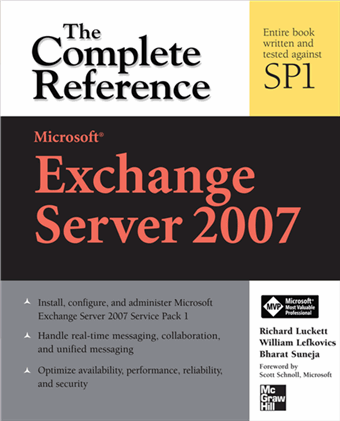Exchange Server 2007 "Business Launch", Edition Comparison: Microsoft removes Store size limits from Standard Edition
Posted by Bharat Suneja at 11:26 AM
As most Exchange folks may already know by now, Exchange Server 2007 will get its business launch along with Windows Vista and Office 2007 come Nov. 30th. From the number of times I've been asked if that is indeed the RTM date, it's clear this is an eagerly awaited Exchange release.
I can't say when it will RTM - that's NDA stuff. However, with the business launch (which is a marketing event) scheduled for end of this month, can the RTM be far behind?
Earlier last week Microsoft quietly published details of Exchange Server 2007 Editions and CAL (Client Access License) requirements. Here's the good news: Exchange Server Standard Edition will allow a maximum of 5 Stores in (a maximum of) 5 Storage Groups! Wait, there's more - the Store sizes are unlimited! This is a step up from the 16 Gb Store limit of Standard Edition in previous versions, which was raised to a maximum of 75 Gb in Exchange Server 2003 SP2.
Further, the Local Continuous Replication (LCR) feature that replicates a mailbox Store to another volume on the same server, and allows Exchange to switch to the replica in case of a Store/storage-related disaster, will be available in Standard Edition.
You will still need the Enterprise Edition for clustering.
On the CAL side, there are now Standard and Entperise CALs - the latter's required to access Unified Messaging, Per-User and Per-DL Journaling, Managed Email Folders, and also buys you Exchange Hosted Filtering and Forefront Security for Exchange (that's the new version of Sybari Antigen - the anti-virus software for Exchange that many Exchange folks regard as best of breed. Microsoft bought Sybari sometime last year).
Finally, the difference between Standard and Enterprise editions makes a lot more sense.
I can't say when it will RTM - that's NDA stuff. However, with the business launch (which is a marketing event) scheduled for end of this month, can the RTM be far behind?
Earlier last week Microsoft quietly published details of Exchange Server 2007 Editions and CAL (Client Access License) requirements. Here's the good news: Exchange Server Standard Edition will allow a maximum of 5 Stores in (a maximum of) 5 Storage Groups! Wait, there's more - the Store sizes are unlimited! This is a step up from the 16 Gb Store limit of Standard Edition in previous versions, which was raised to a maximum of 75 Gb in Exchange Server 2003 SP2.
Further, the Local Continuous Replication (LCR) feature that replicates a mailbox Store to another volume on the same server, and allows Exchange to switch to the replica in case of a Store/storage-related disaster, will be available in Standard Edition.
You will still need the Enterprise Edition for clustering.
On the CAL side, there are now Standard and Entperise CALs - the latter's required to access Unified Messaging, Per-User and Per-DL Journaling, Managed Email Folders, and also buys you Exchange Hosted Filtering and Forefront Security for Exchange (that's the new version of Sybari Antigen - the anti-virus software for Exchange that many Exchange folks regard as best of breed. Microsoft bought Sybari sometime last year).
Finally, the difference between Standard and Enterprise editions makes a lot more sense.
Labels: Exchange Server 2007, Microsoft

 Exchangepedia Blog is read by visitors from all 50 US States and 150 countries world-wide
Exchangepedia Blog is read by visitors from all 50 US States and 150 countries world-wide



1 Comments:
That is a good move and it's about time.
Post a Comment
Links to this post:
Create a Link
<< Home